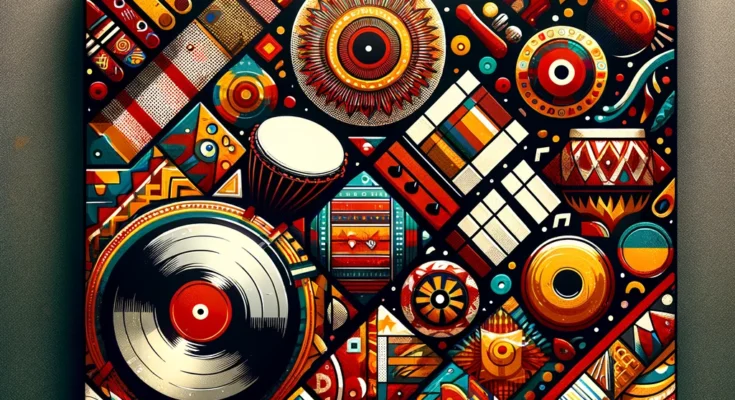African music is a vibrant and integral part of global culture. With its diverse rhythms, rich melodies, and powerful vocals, African music has captivated audiences around the world. From traditional tribal chants to contemporary Afrobeat hits, African music reflects the history, culture, and spirit of the continent. In this article, we will explore the rich musical heritage of Africa, the evolution of African music over time, its role in society, the diversity of African music genres, the top African music hits of all time, its influence on global pop culture, the celebration of African music through festivals and concerts, and the challenges and opportunities in promoting African music. Join us on this musical journey through Africa.
Key Takeaways
- African music has a rich heritage that celebrates the rhythm of the continent.
- The evolution of African music has been influenced by various factors, including colonization and globalization.
- African music plays a significant role in society, from cultural celebrations to political movements.
- The diversity of African music genres is vast, ranging from traditional to modern styles.
- African music has had a significant influence on global pop culture, with many hits and artists achieving worldwide success.
The Rich Musical Heritage of Africa
African music has a deep-rooted history that dates back thousands of years. It is deeply intertwined with traditional African culture and plays a significant role in various aspects of society. Music is not just entertainment in Africa; it is a means of communication, storytelling, and cultural expression. In traditional African societies, music is used to celebrate births, weddings, and other important life events. It is also used to communicate with ancestors and spirits, as well as to heal and bring communities together.
The musical heritage of Africa is incredibly diverse, with each region and ethnic group having its own unique styles and traditions. From the rhythmic drumming of West Africa to the melodic chants of East Africa, from the soulful vocals of Southern Africa to the call-and-response singing of Central Africa, African music encompasses a wide range of sounds and styles. Instruments such as drums, xylophones, flutes, and stringed instruments like the kora and ngoni are commonly used in traditional African music.
The Evolution of African Music
Over time, African music has evolved and adapted to incorporate influences from other cultures. The arrival of European colonizers brought new instruments, musical styles, and influences to Africa. This fusion of African and European musical traditions gave birth to new genres such as Afro-Cuban music and Highlife. In the 20th century, African music continued to evolve with the introduction of Western instruments like the guitar and the influence of American jazz, blues, and rock music.
In recent decades, technology has played a significant role in shaping modern African music. The rise of recording studios, digital production tools, and the internet has made it easier for African musicians to create and distribute their music. This has led to the emergence of new genres such as Afrobeat, Afrobeats, and Afro-pop, which have gained popularity not only in Africa but also globally.
The Role of African Music in Society
African music serves various functions in society. In religious contexts, music is used to connect with the divine and invoke spiritual experiences. Traditional African religions often incorporate music and dance as part of their rituals and ceremonies. In cultural contexts, music is a way to preserve and pass down traditions from one generation to another. It is also a means of expressing cultural identity and pride.
Music has also played a significant role in political movements and social change in Africa. During times of struggle and oppression, music has been used as a tool for resistance and activism. Artists like Fela Kuti in Nigeria and Miriam Makeba in South Africa used their music to speak out against injustice and advocate for social change. Today, African musicians continue to use their platform to address social issues such as poverty, corruption, and inequality.
The Diversity of African Music Genres
African music is incredibly diverse, with each region having its own unique genres and styles. Traditional African music includes genres such as Highlife from Ghana, Mbalax from Senegal, Soukous from Congo, Juju from Nigeria, and Taarab from East Africa. These genres are characterized by their infectious rhythms, melodic hooks, and powerful vocals.
In addition to traditional genres, Africa has also seen the rise of contemporary and fusion styles. Afrobeat, popularized by Nigerian musician Fela Kuti, combines elements of jazz, funk, and traditional African music. Afrobeats, on the other hand, is a more modern genre that incorporates elements of hip-hop, R&B, and dancehall. Artists like Wizkid, Burna Boy, and Davido have helped popularize Afrobeats globally.
The Top African Music Hits of All Time
African music has produced some of the most popular and influential hits of all time. From the iconic “Pata Pata” by Miriam Makeba to the infectious “Zombie” by Fela Kuti, these songs have not only shaped African music but have also had a significant impact on global pop culture. Other notable hits include “Sweet Mother” by Prince Nico Mbarga, “Ye” by Burna Boy, and “Jerusalema” by Master KG featuring Nomcebo Zikode.
These songs have not only topped charts in Africa but have also gained international recognition and acclaim. They have been sampled and covered by artists from around the world and have helped bring African music to a global audience.
The Influence of African Music on Global Pop Culture
African music has had a profound influence on global pop culture. In recent years, there has been a resurgence of interest in African music, with artists from around the world incorporating African rhythms and sounds into their music. The rise of Afrobeat in particular has gained significant popularity globally, with artists like Beyoncé, Drake, and Major Lazer collaborating with African musicians.
The incorporation of African rhythms and sounds in popular music has brought a fresh and vibrant energy to the global music scene. It has also helped break down cultural barriers and promote a more inclusive and diverse representation of music.
Celebrating African Music Through Festivals and Concerts
African music is celebrated and showcased through various festivals and concerts around the world. These events provide a platform for African musicians to share their music, connect with audiences, and promote African culture. Some of the most popular African music festivals include the Cape Town International Jazz Festival in South Africa, the Felabration in Nigeria, and the Sauti za Busara festival in Zanzibar.
These festivals not only feature performances by African artists but also provide opportunities for cultural exchange and collaboration between musicians from different parts of the world. They are a celebration of the diversity and richness of African music and serve as a reminder of its enduring legacy.
Music Promotion in Africa: Challenges and Opportunities
While African music has gained significant recognition globally, there are still challenges facing African musicians in promoting their music. Limited resources, lack of infrastructure, and the dominance of Western music in mainstream media are some of the obstacles that African artists face. However, there are also opportunities for growth and development in the African music industry.
The rise of digital platforms and streaming services has made it easier for African musicians to reach a global audience. Artists can now distribute their music online, connect with fans through social media, and collaborate with artists from around the world. There is also a growing interest in African music among international audiences, which presents opportunities for African artists to expand their fan base and gain recognition on a global scale.
The Enduring Legacy of African Music
In conclusion, African music is a vibrant and integral part of global culture. Its rich heritage, diverse genres, and powerful rhythms have captivated audiences around the world. From traditional tribal chants to contemporary Afrobeat hits, African music reflects the history, culture, and spirit of the continent.
Despite the challenges faced by African musicians in promoting their music, there are opportunities for growth and development in the African music industry. The rise of digital platforms and the growing interest in African music globally provide avenues for African artists to reach a wider audience and gain recognition on a global scale.
As we celebrate the rhythm of Africa, let us explore and embrace the richness and diversity of African music. Let us appreciate the enduring legacy of African music and its contribution to global pop culture. Whether it’s dancing to the infectious beats of Afrobeat or immersing ourselves in the soulful melodies of traditional African music, let us celebrate and honor the rhythm of Africa.
Check out this article on the ultimate guide to TikTok trends in 2023. It explores the latest viral music trends on the popular social media platform and how they are shaping the music industry. From catchy dance challenges to viral sound bites, TikTok has become a powerful tool for promoting and discovering new music. Find out how artists are leveraging this platform to gain exposure and connect with fans in innovative ways. Read more
FAQs
What is Beats of Africa?
Beats of Africa is an article that celebrates the greatest music hits from the African continent.
What kind of music is featured in the article?
The article features a variety of music genres from Africa, including Afrobeat, Highlife, Juju, and Soukous.
Who are some of the artists featured in the article?
The article features some of the most iconic African musicians, including Fela Kuti, Miriam Makeba, Youssou N’Dour, and Salif Keita.
What is the significance of African music?
African music has a rich cultural and historical significance, as it has been used for storytelling, religious ceremonies, and social gatherings for centuries. It has also influenced many other music genres around the world.
What is Afrobeat?
Afrobeat is a music genre that originated in Nigeria in the 1960s and 70s. It combines elements of West African music, jazz, funk, and soul, and is characterized by its complex rhythms and political lyrics.
What is Highlife?
Highlife is a music genre that originated in Ghana in the early 20th century. It combines elements of traditional Akan music with Western instruments and rhythms, and is characterized by its upbeat tempo and danceable rhythms.
What is Juju music?
Juju music is a music genre that originated in Nigeria in the 1920s. It combines elements of traditional Yoruba music with Western instruments and rhythms, and is characterized by its use of talking drums and call-and-response vocals.
What is Soukous music?
Soukous music is a music genre that originated in Congo in the 1930s. It combines elements of traditional Congolese music with Cuban rhythms and instruments, and is characterized by its fast-paced guitar riffs and danceable rhythms.



